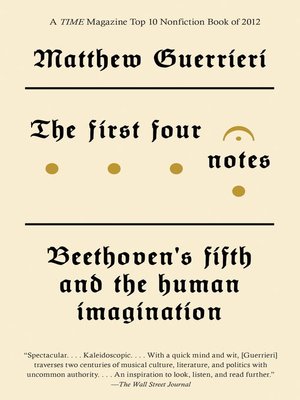
Sign up to save your library
With an OverDrive account, you can save your favorite libraries for at-a-glance information about availability. Find out more about OverDrive accounts.
Find this title in Libby, the library reading app by OverDrive.



Search for a digital library with this title
Title found at these libraries:
| Library Name | Distance |
|---|---|
| Loading... |
A TIME Magazine Top 10 Nonfiction Book of 2012
A New Yorker Best Book of the Year
Los Angeles Magazine's #1 Music Book of the Year
A unique and revelatory book of music history that examines in great depth what is perhaps the best-known and most-popular symphony ever written and its four-note opening, which has fascinated musicians, historians, and philosophers for the last two hundred years.
Music critic Matthew Guerrieri reaches back before Beethoven’s time to examine what might have influenced him in writing his Fifth Symphony, and forward into our own time to describe the ways in which the Fifth has, in turn, asserted its influence. He uncovers possible sources for the famous opening notes in the rhythms of ancient Greek poetry and certain French Revolutionary songs and symphonies. Guerrieri confirms that, contrary to popular belief, Beethoven was not deaf when he wrote the Fifth. He traces the Fifth’s influence in China, Russia, and the United States (Emerson and Thoreau were passionate fans) and shows how the masterpiece was used by both the Allies and the Nazis in World War II. Altogether, a fascinating piece of musical detective work—a treat for music lovers of every stripe.
A New Yorker Best Book of the Year
Los Angeles Magazine's #1 Music Book of the Year
A unique and revelatory book of music history that examines in great depth what is perhaps the best-known and most-popular symphony ever written and its four-note opening, which has fascinated musicians, historians, and philosophers for the last two hundred years.
Music critic Matthew Guerrieri reaches back before Beethoven’s time to examine what might have influenced him in writing his Fifth Symphony, and forward into our own time to describe the ways in which the Fifth has, in turn, asserted its influence. He uncovers possible sources for the famous opening notes in the rhythms of ancient Greek poetry and certain French Revolutionary songs and symphonies. Guerrieri confirms that, contrary to popular belief, Beethoven was not deaf when he wrote the Fifth. He traces the Fifth’s influence in China, Russia, and the United States (Emerson and Thoreau were passionate fans) and shows how the masterpiece was used by both the Allies and the Nazis in World War II. Altogether, a fascinating piece of musical detective work—a treat for music lovers of every stripe.







